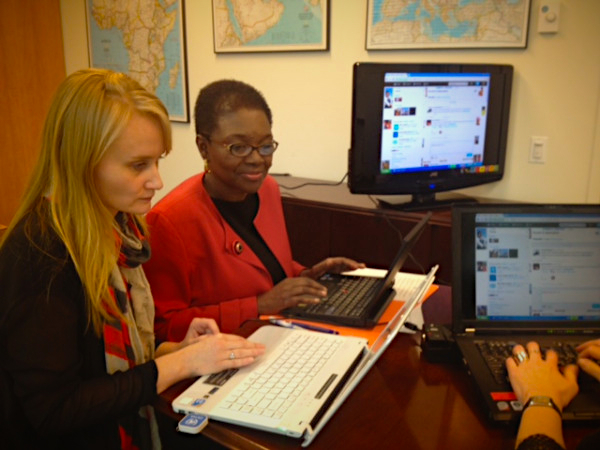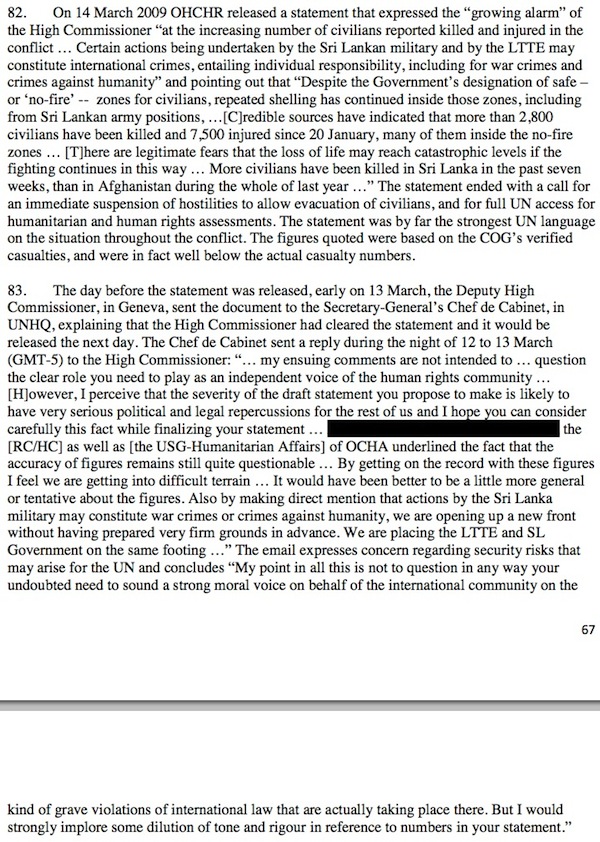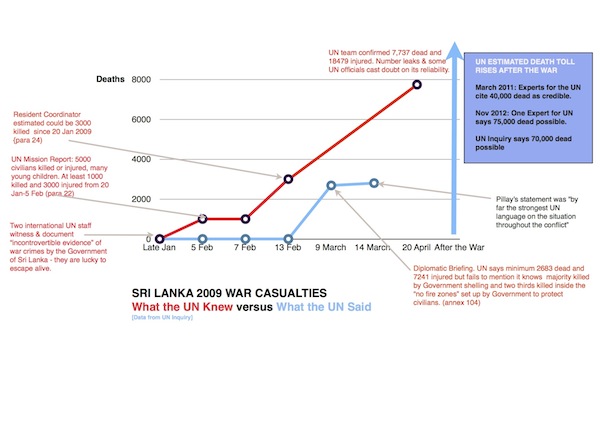On 18th December 2012, at around 10pm in Sri Lanka, Valerie Amos, the UN Under-Secretary-General for Humanitarian Affairs and Emergency Relief Coordinator took to Twitter, ostensibly to answer questions related to the UN’s role, relevance and responsibilities regarding humanitarian aid and relief work. The event with Baroness Amos was announced via the Twitter account of, inter alia, UN OCHA, which also had a photo of her in front of a laptop, getting ready to face the questions.
.@ValerieAmos is now replying to questions from @AlertNet and Twitter users around the world. #AskValerie http://t.co/UJFY3JZT
— UNOCHA (@UNOCHA) December 18, 2012
The event was conducted with the hashtag #AskValerie. Baroness Amos is (whether through office aides or by herself it remains unclear) fairly active on Twitter via @ValerieAmos. However, despite her own and OCHA’s familiarity with web based social media interactions, yesterday’s Twitter question time with Baroness Amos was a cogent example of how not to curate and conduct public debates when one is ill prepared to take on, and answer, hard questions. It reflected extremely poorly on the professionalism of Baroness Amos, the chief participant, her staff, pictured in the photos with her during the session, UN OCHA as the institution represented and the UN system writ large. Vital questions repeatedly posed by Groundviews and others, which didn’t generate even a simple acknowledgement, are now a public and permanent record of the UN’s continued role as an infuriating firewall of information vital for a fuller record of the end of Sri Lanka’s war.
A partial account of the answers Baroness Amos gave over Twitter during the #AskValerie session can be seen below.
No sooner than the event started, Groundviews submitted two questions to Baroness Amos, the first in the session from Sri Lanka and on Sri Lanka.
1. Dear Ms. Amos, when will @UNOCHA release casualty figures for #srilanka during the end of its war, which you have? #lka @reliefweb
— Groundviews (@groundviews) December 18, 2012
2. If, Ms. Amos, @UNOCHA will not release these figures, even after @UN's damning Pietrie report, why not? #lka #srilanka @reliefweb
— Groundviews (@groundviews) December 18, 2012
Since these were directed to @UNOCHA and @reliefweb, we republished them, this time directly referencing the Baroness’s official Twitter account.
1. Dear Ms. Amos, when will @UNOCHA release casualty figures for #srilanka during the end of its war, which you have? #lka @ValerieAmos
— Groundviews (@groundviews) December 18, 2012
2. If, Ms. Amos, @UNOCHA will not release these figures, even after @UN's damning Pietrie report, why not? #lka #srilanka @ValerieAmos
— Groundviews (@groundviews) December 18, 2012
At the same time, we sent around a hurried email about then live session on Twitter in the hope more would ask Baroness Amos questions regarding damning findings of the UN’s devastating Petrie report on the end of the war in Sri Lanka, flagging the failure of the entire UN system to protect human lives and worse, possible complicity in human rights violations. The first version of the report released by the UN into the public domain (which was mirrored by Groundviews) was very quickly replaced by another version. The difference between the two versions was in the production of the PDF – redacted text in the first version could be easily be read. In the second version, the redactions were done more professionally. Of importance to the Twitter session featuring Baroness Amos was the debate over the UN’s non-release of casualty figures. As Page 67 of the Petrie report notes,
As exiled Sri Lankan journalist J.S. Tissainayagam noted in March,
Another controversy was the UN’s refusal to release casualty figures in the final months of fighting in Sri Lanka. The UN initially maintained “we do not count bodies.” However, the Inner City Press said on March, 18, 2009 that leaked documents revealed the UN’s Office of the Coordinator of Humanitarian Affairs (OCHA) did have the numbers, which were deliberately withheld. The Inner City Press observed that “unlike in other conflicts from Darfur to Gaza, the UN withheld the Sri Lanka figures, in effect protecting the Sri Lankan government.”
Author of Still Counting the Dead and former BBC correspondent Frances Harrison has an interesting and informative infographic about the numbers privately known and publicly released by the UN (for larger version, click here).
All this is to say that despite the Petrie’s own observations that the UN withheld for short term strategic leverage the numbers of the dead in Sri Lanka – a calculated prevarication that ironically put many more people in harm’s way – the UN system and OCHA are still unwilling to release the casualty figures they were working with at the time.
https://twitter.com/niclawrence/status/281053107255930880
What or who inspired you the most during your trips in 2012? #AskValerie #aid
— TR_Foundation News (@AlertNet) December 18, 2012
The tweets above are just two examples of the sort of questions that were asked of Baroness Amos. Note that @AlertNet was in fact the host of the event. Another was,
#AskValerie How does @ValerieAmos take care of herself so she can continue helping others?
— Lsd (@lsd_lives) December 17, 2012
to which Baroness Amos responded by noting,
.@lsd_lives Badly! But I try to stay healthy, eat properly and smile when I can. #AskValerie
— Valerie Amos (@ValerieAmos) December 18, 2012
But while we now know that the Head of UN OCHA likes to keep fit and smile as often as she can – clearly, in the OCHA’s eyes, vital information for the world to ruminate – there was complete silence over the questions we posed, which by this time had been retweeted, and others pitching in with similar questions as well.
Al Jazeera’s @marcellehopkins noted,
@groundviews asks @ValerieAmos of @UNOCHA: Will UN release casualty figures for end of war in #SriLanka? #AskValerie
— Marcelle Hopkins (@marcellehopkins) December 18, 2012
Alan Keenan from the International Crisis Group averred,
@groundviews @marcellehopkins Yes, I'd like to see UN figures, too; but be careful: they'll be far lower than actual # of deaths.
— Alan Keenan (@akeenan23) December 18, 2012
A regular voice on the Sri Lankan twittersphere @WHOASriLawi exasperatingly mentioned,
@iromip @groundviews @ValerieAmos @UN @UNOCHA honestly ridiculous, time for banter but not for more serious topics?
— Nuwan (@WHOASriLawi) December 18, 2012
Alright #lka people. If you all speak (or tweet) up,@ValerieAmos may not be able to ignore! #AskValerie about UNOCHA and figures on lka dead
— Nuwan (@WHOASriLawi) December 18, 2012
As we noted half way into the session,
Increasingly evident @ValerieAmos avoiding hard questions on #srilanka during live Twitter exchange #AskValerie @7piliers @UNOCHA Tragic!
— Groundviews (@groundviews) December 18, 2012
And when @AlertNet said the session was over, without a single question over Sri Lanka going answered or even remotely referenced, we noted,
@AlertNet It was truly pathetic. @valerieamos & @UNOCHA should be very ashamed at the quality of that event. @7piliers #lka #srilanka
— Groundviews (@groundviews) December 18, 2012
By the morning of the 19th in Sri Lanka, even though the session had long since ended, these tweets had been repeatedly retweeted overnight, going out to thousands and creating in the process a rather tragic record of what Baroness Amos and her OCHA staff evaded, despite being repeatedly pressed to answer.
There is a better model for this. When some months ago, the Assistant Secretary, South And Central Asian Affairs at the US State Department and former Ambassador to Sri Lanka Robert Blake took to Twitter to answer, much like Baroness Amos, questions from the public, we tweeted and wrote about it to generate questions, out of which not a single one was answered during the official session. We collated all the questions and put it up on Bundlr. Whether or not we were solely responsible for it, Robert Blake, through Twitter, got back and apologised for not answering any of the questions in the limited time he had, and even had a further exchange with us.
However, it evident that Baroness Amos and her staff are not really interested in addressing difficult questions on Sri Lanka, whether over Twitter, other media or face to face. And so this circus will move on – online events held only to notch up a year’s quota of new media interactions to make the UN appear vibrant and cutting-edge, yet with little or no thought given to meeting expectations these events create or generating considered responses to hard questions that when unanswered, ferment even more discontent and anger against an institution that has failed in Sri Lanka, and how!




